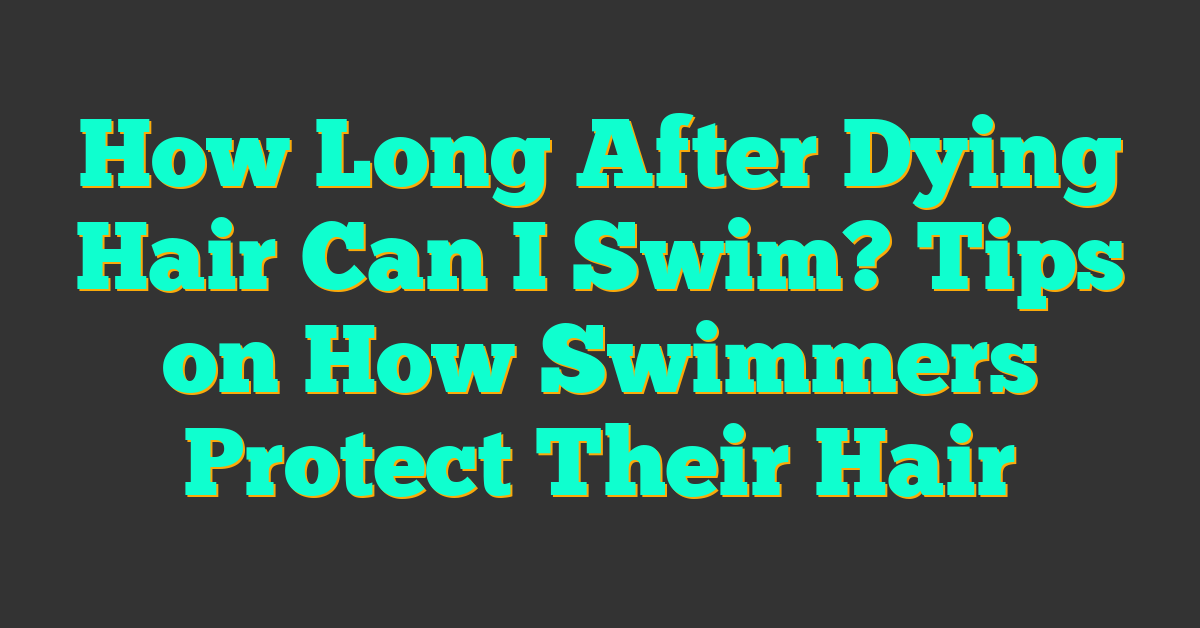Are you planning to go for a swim after dyeing your hair? If so, you might be wondering how long you should wait before diving into the pool. Chlorine in the pool water can fade your hair color and make it look dull and lifeless. In this article, we will discuss how long after dying hair can you swim and how swimmers can protect their hair from chlorine damage.


Hair dyeing is a popular way to change your hair color, but it also requires proper maintenance to keep the color looking vibrant and fresh. Chlorine in pool water can strip the hair of its natural oils and cause the color to fade quickly. To prevent this, it is important to understand how long you should wait after dyeing your hair before going for a swim and what strategies you can use to protect your hair from chlorine damage.
Key Takeaways
- Wait at least 3-5 days after dyeing your hair before swimming to prevent chlorine damage.
- Pre-swim hair protection strategies like wetting your hair and using leave-in conditioner can help minimize chlorine absorption.
- Proper post-swim hair care, including rinsing your hair with fresh water and using a clarifying shampoo, can help remove chlorine residue and prevent damage to your hair.
Understanding Hair and Pool Water Interaction
https://www.youtube.com/watch?v=XEOvJVpq198&embed=true
If you have recently dyed your hair and you’re planning to go swimming, it’s essential to know how pool water can affect your color-treated hair. Chlorine and saltwater can cause damage to your hair, leading to fading, discoloration, and even a greenish tint. In this section, we’ll discuss the effects of chlorine and saltwater on dyed hair and how you can protect your hair while swimming.
The Effects of Chlorine on Dyed Hair
Chlorine is a chemical commonly used to disinfect pool water. While it helps to kill bacteria and other harmful microorganisms, it can also have a damaging effect on your hair. Chlorinated water can strip your hair of its natural oils, leading to dryness, brittleness, and breakage. If you have color-treated hair, chlorine can also cause your color to fade quickly, become dull, or even change color.
To minimize the effects of chlorine on your hair, you can try the following tips:
- Wet your hair before swimming to prevent it from absorbing too much chlorine.
- Wear a swim cap to protect your hair from direct contact with chlorinated water.
- Rinse your hair with fresh water after swimming to remove any residual chlorine.
Saltwater and Hair Color
While saltwater is less harsh than chlorinated water, it can still have a damaging effect on your hair. Saltwater can cause your hair to become dry and brittle, leading to breakage and split ends. If you have color-treated hair, saltwater can also cause your color to fade faster than normal.
To protect your hair while swimming in saltwater, you can try the following tips:
- Wet your hair before swimming to prevent it from absorbing too much saltwater.
- Apply a leave-in conditioner or oil to your hair before swimming to help protect it from the drying effects of saltwater.
- Rinse your hair with fresh water after swimming to remove any residual saltwater.
By following these tips, you can help protect your color-treated hair from the damaging effects of pool water.
Pre-Swim Hair Protection Strategies
https://www.youtube.com/watch?v=dN3I2QEqYJY&embed=true
Swimming is a fun and healthy activity, but it can damage your hair if you don’t take precautions. Chlorine in pool water can strip the hair of its natural oils, leaving it dry, brittle, and prone to breakage. Additionally, saltwater can also harm your hair, especially if it’s been chemically treated. Here are some pre-swim hair protection strategies you can use to keep your hair healthy and strong.
Choosing the Right Swim Cap
Wearing a swim cap is one of the best ways to protect your hair from chlorine and saltwater. Swim caps create a barrier between your hair and the water, reducing the amount of damage caused by exposure to chemicals and salt. When choosing a swim cap, look for one made of silicone or latex, as these materials are durable and can withstand repeated use. Additionally, make sure the swim cap fits snugly around your head to prevent water from seeping in.
Pre-Swim Hair Care Products
Using the right hair care products before you swim can also help protect your hair. Leave-in conditioners, for example, can help moisturize your hair and prevent it from drying out. Coconut oil, olive oil, argan oil, and jojoba oil are also great natural oils that can provide a protective barrier between your hair and the water. Apply a small amount of oil to your hair before you swim to help keep it healthy and strong.
Another important pre-swim hair care product is sunscreen. Just like your skin, your hair can also be damaged by UV rays. Look for a hair care product that contains SPF protection to help shield your hair from the sun’s harmful rays.
In conclusion, protecting your hair before you swim is essential to maintaining its health and strength. By using the right swim cap and hair care products, you can minimize the damage caused by exposure to chemicals and saltwater. So, before you hit the pool or beach, make sure you take the necessary steps to protect your hair.
Proper Post-Swim Hair Care
https://www.youtube.com/watch?v=skl90HDbsx8&embed=true
Swimming is a fun and refreshing activity, but it can also be damaging to your hair, especially if you have dyed hair. Chlorine and other chemicals in pool water can strip your hair of its natural oils, leaving it dry and brittle. Here are some tips to properly care for your hair after swimming:
Rinsing and Cleansing
« How Long After Bleaching Hair Can You Swim? What Happens If You Swim Too Early?
How Long After Ear Piercing Can You Swim? What Not to Do »
After swimming, rinse your hair with fresh water to remove any chlorine or saltwater residue. You can also use a clarifying shampoo to help remove any buildup. However, be careful not to overuse clarifying shampoo as it can strip your hair of its natural oils and cause it to become dry and brittle.
Deep Conditioning and Treatment
To restore moisture to your hair and prevent damage, it’s important to use a deep conditioning mask or hair treatment regularly. Look for products that are specifically designed for color-treated hair, as they will help to maintain your hair’s vibrancy and prevent fading. You can also use a conditioning hair mask once a week to keep your hair healthy and shiny.
When choosing a shampoo and conditioner, opt for sulfate-free formulas as they are gentler on your hair and won’t strip away the color. Additionally, avoid using hot tools such as blow dryers and flat irons as they can further damage your hair.
Overall, proper hair maintenance and deep conditioning treatments are key to keeping your hair healthy and vibrant after swimming. By following these tips, you can enjoy your time in the pool or ocean without worrying about damaging your hair.
Choosing the Right Hair Products for Swimmers

As a swimmer, your hair is exposed to chlorine and other chemicals in the pool water that can damage your hair cuticle, leaving it dry, brittle, and prone to breakage. To protect your hair from these harmful effects, it is important to choose the right hair products that are specifically designed for swimmers.
Shampoos and Conditioners for Swimmers
When it comes to choosing a shampoo and conditioner for swimmers, look for products that are formulated to remove chlorine and other chemicals from your hair. These products are typically labeled as “swimmer’s shampoos” or “chlorine removal shampoos” and are designed to gently cleanse your hair without stripping it of its natural oils.
Some of the best shampoos and conditioners for swimmers include:
UltraSwim Chlorine Removal Shampoo and Conditioner: This product is specially formulated to remove chlorine and other chemicals from your hair, leaving it clean and refreshed.
Malibu C Swimmers Wellness Shampoo and Conditioner: This product is designed to remove chlorine, copper, and other chemicals from your hair, while also restoring moisture and shine.
Paul Mitchell Shampoo Three and The Conditioner: This product is great for swimmers with color-treated hair, as it helps to remove chlorine and other chemicals that can cause fading.
Leave-In Treatments and Oils
In addition to using a swimmer’s shampoo and conditioner, it is also important to use a leave-in treatment or oil to protect your hair from the damaging effects of chlorine and other chemicals. These products can help to prevent dryness, breakage, and split ends, while also improving the overall health and appearance of your hair.
Some of the best leave-in treatments and oils for swimmers include:
SwimSpray Chlorine Removal Spray: This product is designed to neutralize chlorine and other chemicals in your hair, leaving it soft and manageable.
It’s a 10 Miracle Leave-In Product: This product is a great all-in-one treatment that helps to detangle, protect, and nourish your hair, while also adding shine and reducing frizz.
MoroccanOil Treatment: This product is a lightweight oil that helps to nourish and protect your hair from the damaging effects of chlorine and other chemicals, leaving it soft, smooth, and shiny.
By using the right hair products for swimmers, you can protect your hair from the damaging effects of chlorine and other chemicals, while also keeping it healthy, strong, and beautiful. So, next time you hit the pool, make sure to pack your swimmer’s shampoo, conditioner, and leave-in treatment, and enjoy your swim without worrying about the health of your hair.
Hair Dye and Swimming FAQs

Timing Between Dyeing and Swimming
You’ve just dyed your hair, and you’re wondering how long you should wait before going swimming. The answer depends on the type of hair dye you used. If you used permanent hair dye, you should wait at least 7-10 days before swimming in a pool or ocean. This is because the chemicals in the dye can make the hair more porous, which can cause the color to fade or even change. If you used semi-permanent color, you can go swimming in as little as three days.
Dealing with Chlorine Damage and Discoloration
Chlorine can be damaging to hair, especially if it’s been bleached or dyed. It can cause the hair to become dry, brittle, and prone to breakage. Chlorine can also strip the hair of its natural oils, which can cause it to become dull and lifeless. To protect your hair from chlorine damage, you can take a few steps.
First, wet your hair with fresh water before getting into the pool or ocean. This will help to reduce the amount of chlorine that your hair absorbs. Second, wear a swim cap. This will help to keep the chlorine out of your hair. Third, rinse your hair thoroughly with fresh water after swimming. This will help to remove any chlorine residue that may be left behind.
If your hair has already been damaged by chlorine, there are a few things you can do to help restore its vibrancy. You can use a deep conditioning treatment to help nourish and moisturize your hair. You can also use a clarifying shampoo to help remove any chlorine buildup. Additionally, you may want to consider using a leave-in conditioner or hair oil to help protect your hair from further damage.
In conclusion, it’s important to take care of your hair when swimming, especially if you’ve recently dyed it. By following these tips, you can help to protect your hair from damage and keep it looking healthy and vibrant.
Frequently Asked Questions

What’s the recommended waiting period before swimming after a hair dye?
If you have recently dyed your hair, it’s important to wait before swimming. The recommended waiting period varies depending on the type of dye used. For permanent and demi-permanent colors, it’s best to hold off for at least a week before you go swimming. Permanent hair dye contains harsh chemicals that may react with the chlorine in pool water and ruin your color. Semi-permanent hair color, on the other hand, uses fewer chemicals and can be less damaging to your hair. You can usually go swimming in as little as three to five days if you use semi-permanent color. However, it’s still best to wait a week if you want to be extra cautious.
Are there any special precautions for swimming with semi-permanent hair color?
While semi-permanent hair color is less damaging to your hair than permanent dye, it’s still important to take precautions when swimming. Before you go swimming, you can apply a leave-in conditioner to your hair to help protect it from chlorine damage. You can also wear a swim cap to keep your hair dry. If you don’t want to wear a swim cap, you can wet your hair with fresh water before you go swimming. This will help prevent your hair from absorbing as much chlorine.
What are the best ways to shield dyed hair from chlorine damage?
Chlorine can be very damaging to dyed hair. To protect your hair from chlorine damage, you can apply a leave-in conditioner to your hair before you go swimming. This will help create a barrier between your hair and the chlorine. You can also wear a swim cap to keep your hair dry. If you don’t want to wear a swim cap, you can wet your hair with fresh water before you go swimming. This will help prevent your hair from absorbing as much chlorine. After swimming, it’s important to rinse your hair with fresh water to remove any chlorine residue.
How long should I wait to swim in a pool after getting highlights?
If you have highlights in your hair, you should wait at least a week before you go swimming. The bleach used to create highlights can make your hair more porous, which can make it more susceptible to chlorine damage. Waiting a week will give your hair time to recover and help prevent damage.
What strategies do swimmers use to maintain their hair color?
Swimmers who want to maintain their hair color often use special shampoos and conditioners that are designed to remove chlorine from the hair. These products can help prevent chlorine buildup and keep your hair looking healthy. Some swimmers also use hair masks or deep conditioning treatments to help repair any damage caused by chlorine exposure.
Does swimming in natural bodies of water affect dyed hair differently than pools?
Swimming in natural bodies of water, such as lakes or oceans, can affect dyed hair differently than pools. Natural bodies of water may contain minerals or other substances that can cause discoloration or damage to your hair. If you plan to swim in natural bodies of water, it’s a good idea to wet your hair with fresh water before you go swimming. After swimming, rinse your hair with fresh water to remove any salt or other substances that may have accumulated on your hair.










